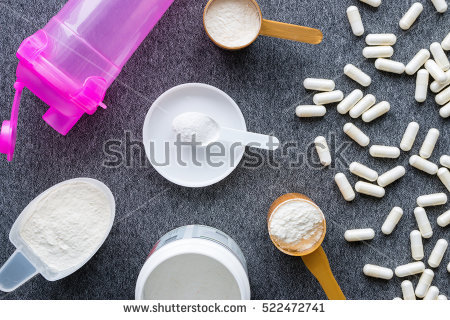
미국 국립보건원이 건강 보조제 성분을 분석해 자료를 내놓았다.
자료집은 ‘운동 보조제(Performance supplements)’와 ‘체중 감량 보조제(Weight loss supplements)’로 두 가지.

먼저 운동 보조제. 근력과 지구력을 개선, 운동효율을 높이기 위해 먹는 제품이다. 더 강도 높은 트레이닝을 소화하기 위해 많은 사람들이 찾지만 “건강한 식단을 대체할 순 없고 유해할 수 있다”고 전문가들은 경고했다.
국립보건원은 항산화제, 카페인, 크레아틴, 단백질 등 운동 보조제에 들어가는 20가지 성분에 대해 설명했다.
크레아틴의 경우, 전력질주나 역기 들기 등 짧은 시간에 에너지를 투입하는 운동을 할 때 도움이 될 수 있다. 그러나 장거리 달리기나 수영 등 지구력이 필요한 운동을 할 때는 별 소용이 없다. 비타민 C, E 등 항산화제는 건강을 위해 필요한 물질이지만 운동 능력을 개선하는데 도움이 되지 않는다.
체중 감량 보조제 자료집에서는 라스베리 케톤, 베타 글루칸, 크롬, 녹차 등 관련 제품들이 주로 사용하는 24가지 성분에 대해 분석했다.
크롬의 경우, 감량에 도움이 될 수 있으나, 감량의 정도는 미미하고, 라스베리 케톤은 그 효능과 안전성이 아직 제대로 검증되지 않았다. 녹차를 마시는 것은 안전하지만, 녹차 성분을 알약으로 섭취하는 것은 간에 해로울 수 있다.
앤 썬 박사는 “미국인들은 체중감량 보조제에만 연간 20억 달러를 쓰지만 실제로 효험이 있다는 증거는 많지 않다”고 지적했다.
원문보기
http://m.kormedi.com/news/NewsView.aspx?pArtID=1225954&type=HealthNews#backPopup
관련 문서는 여기서 다운로드 받으시면됩니다.
https://search.nih.gov/search?utf8=✓&affiliate=nih&query=Weight+loss+supplements&commit=Search
아래는 미국립 보건원 홈페이지 내용입니다.
The new year is a time to set new goals, and for many people this means losing weight and improving fitness. Although these goals are best met with a nutritious diet and regular physical activity, many people may turn to dietary supplements for a boost to their routines. To help cut the confusion, the Office of Dietary Supplements (ODS) at the National Institutes of Health has two new resources to help people understand what is known about the effectiveness and safety of many ingredients in dietary supplements promoted for fitness and weight loss.
Dietary Supplements for Exercise and Athletic Performance, covers products — sometimes called ergogenic aids — that claim to improve strength or endurance, increase exercise efficiency, achieve a performance goal more quickly, and increase tolerance for more intense training.
“Dietary supplements marketed for exercise and athletic performance can’t take the place of a healthy diet, but some might have value for certain types of activity,” said Paul M. Coates, Ph.D., director of ODS. “Others don’t seem to work, and some might even be harmful.”
This fact sheet covers more than 20 ingredients found in fitness supplements, including antioxidants, beetroot, tart cherry, branched-chain amino acids, caffeine, creatine, and protein. Creatine, for example, might help with short bursts of high-intensity activity like sprinting or weight lifting, but not for endurance efforts like distance running or swimming. However, antioxidants such as vitamins C and E don’t seem to improve any type of physical activity, though they're needed in small amounts for overall health.
More than two-thirds of adults in the United States are overweight or obese, and many are trying to lose those extra pounds. Dietary Supplements for Weight Loss guides readers through the confusing set of options in the marketplace.
“Americans spend over $2 billion a year on dietary supplements promoted for weight loss, but there’s little evidence they actually work,” said Anne L. Thurn, Ph.D., director of the ODS Communications Program. “And people may not know that many manufacturers of weight-loss supplements don’t conduct studies in humans to find out whether their product works and is safe.”
This fact sheet covers 24 ingredients found in these products, including African mango, beta-glucans, chromium, garcinia, green tea, hoodia, and raspberry ketones. Chromium, for example, might help you lose a very small amount of weight and body fat, and is safe, but raspberry ketones haven’t been studied enough to know whether they're safe or effective. And while drinking green tea is safe, taking green-tea extract pills has been linked to liver damage in some people.
Both fact sheets are available in a health professional version that is detailed and fully referenced, as well as consumer versions in both English and Spanish. In fact, most ODS fact sheets on dietary supplement ingredients are available in these multiple formats.
“We encourage people to talk with their healthcare providers to get advice about dietary supplements and to visit the ODS website to learn valuable information about these products,” said Coates. “People can also sign up for the ODS listserv to be notified when we add new information to our website.”
Part of the Office of the Director at the National Institutes of Health, the Office of Dietary Supplements (ODS), strengthens knowledge and understanding of dietary supplements by evaluating scientific information, stimulating and supporting research, disseminating research results, and educating the public to foster an enhanced quality of life and health for the U.S. population. For more information about ODS and its programs, see https://ods.od.nih.gov.
About the National Institutes of Health (NIH): NIH, the nation's medical research agency, includes 27 Institutes and Centers and is a component of the U.S. Department of Health and Human Services. NIH is the primary federal agency conducting and supporting basic, clinical, and translational medical research, and is investigating the causes, treatments, and cures for both common and rare diseases. For more information about NIH and its programs, visit www.nih.gov.
관련 자료집 다운로드하기
 새해 복많이 받으세요 음식별 칼로리/ 음급진료 129번으로
새해 복많이 받으세요 음식별 칼로리/ 음급진료 129번으로
 신년세일 마포구 공덕동 염리동 아현동 애오개 래미안 헬스장
신년세일 마포구 공덕동 염리동 아현동 애오개 래미안 헬스장





